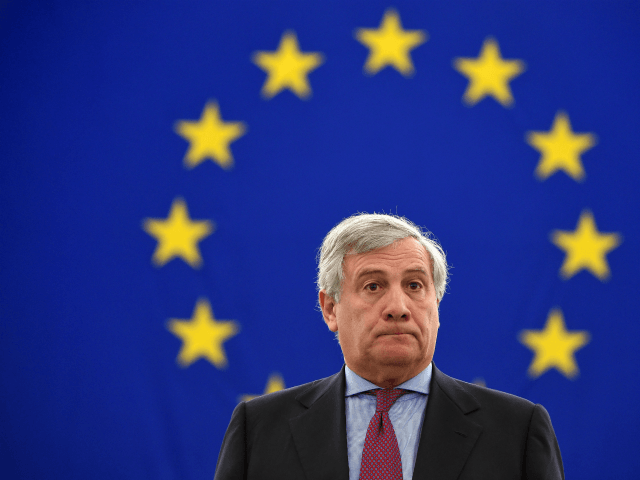European Parliament president Antonio Tajani has said that the experiences of Britain attempting to leave the EU will serve as a “deterrent” to other nations considering leaving the bloc.
Speaking to Germany’s Morgenpost, the Italian politician was asked whether, after nearly three years since the referendum and months of negotiation with obstructive Eurocrats in Brussels, he believed other Eurosceptic member states would be inspired by the UK to leave the bloc.
“I think that’s impossible,” Mr Tajani told the Berlin daily. “The example of the British will serve as a deterrent. We have to change the European Union. But we have to stay together.”
Saying that he would be “very happy if the British stayed in the EU,” he maintained that Brussels would remain inflexible on Prime Minister Theresa May’s withdrawal agreement and would only grant an extension to Article 50 if the UK gave a reason — suggesting a “new election or a new referendum” — but otherwise, the current impasse would not be eased by the bloc.
“They have decided to go. That’s their problem, not ours,” Mr Tajani said.
The hardline position of the EU appears to be working. Breitbart London reported in February that the Eurosceptic populist Sweden Democrats party, set to double their vote share in the May European Parliament (EP) elections, has backed off from supporting a public vote on leaving the EU after observing the way Brussels has treated London.
“Clearly the EU does its utmost to complicate Britain’s departure,” party leader Jimmie Åkesson said last month, adding, “It would be irresponsible for Sweden to leave before knowing how it goes with Britain.”
The UK’s current uncertainty and the Sweden populist u-turn has fulfilled predictions made late last year by senior MEP and progressive Guy Verhofstadt, who is also the EP’s chief Brexit coordinator, who said that the “chaos” of the UK’s exit would stem the rise of populist Euroscepticism in Europe.
“Fortunately, we have Brexit. It illustrates the populist wave, but it has also provoked a resurrection of attachment to the EU within public opinion,” the former prime minister of Belgium said in September.
It is a consistent message from the EU’s bureaucrats and European politicians, with German former diplomat Thomas Matussek admitting in November 2017 that Brussels is “aiming for a Brexit which is as soft as possible but a Brexit which is hard as necessary in order to discourage others to follow the British example, mainly, to try to have the cake and eat it. Which we wouldn’t allow.”
While in March 2017, in the same month the UK triggered the two-year Article 50 procedure, President of the European Commission Jean-Claude Juncker said it would make the Brexit process so difficult that it would deter other states from leaving the bloc, saying, “They will all see from the UK’s example that leaving the EU is a bad idea.”
UK ally and pro-sovereigntist leader of Hungary Viktor Orbán, however, said last year that European prime ministers should resist calls to “punish” the UK, saying, “…what we need is a fair Brexit and a good cooperation between the UK and the European Union in the future.”

COMMENTS
Please let us know if you're having issues with commenting.